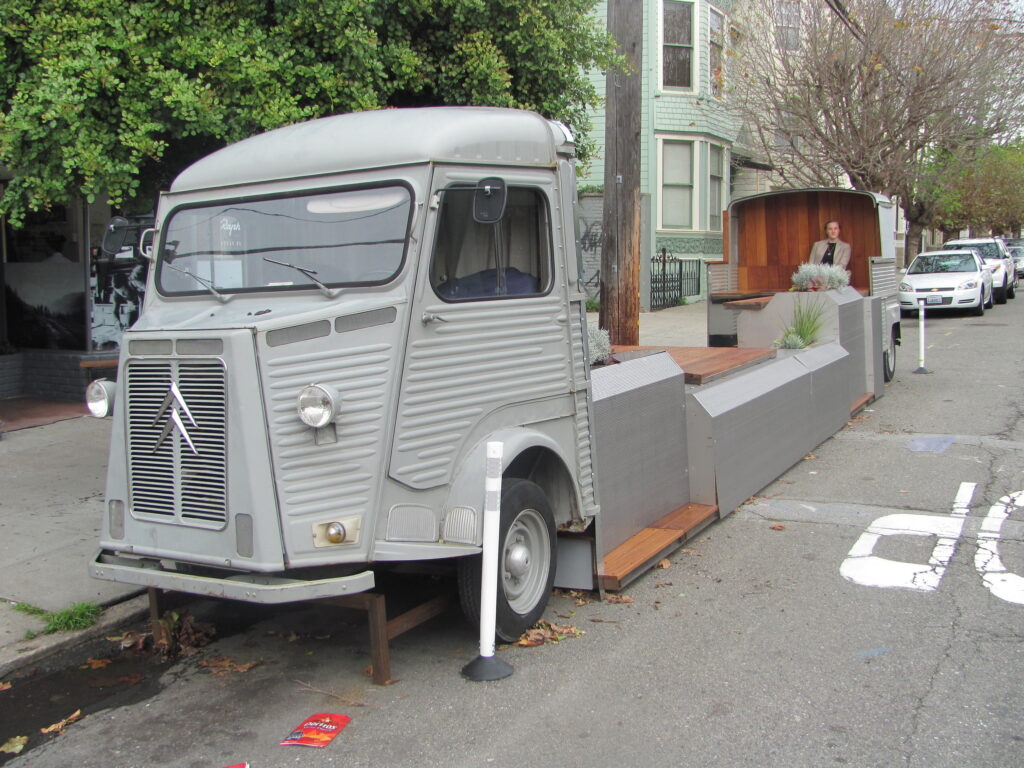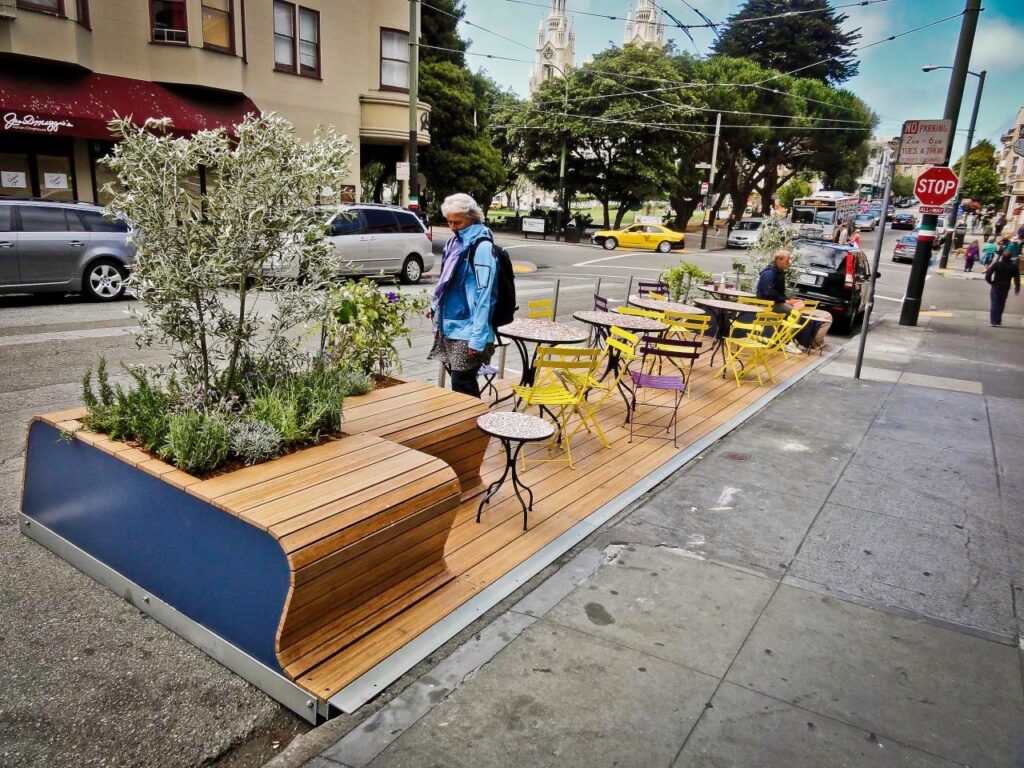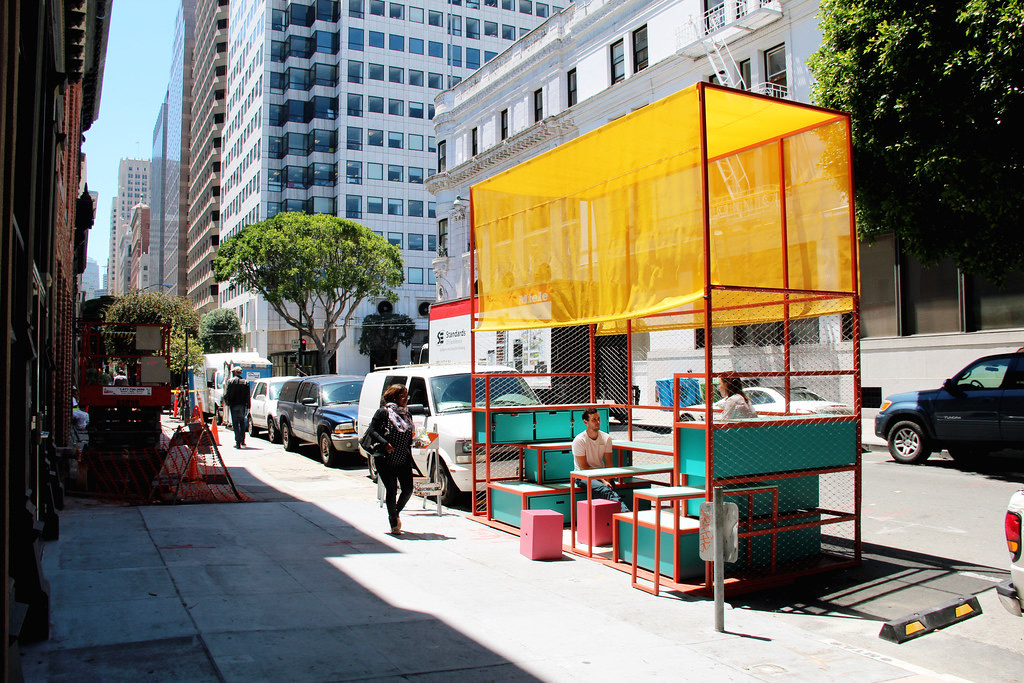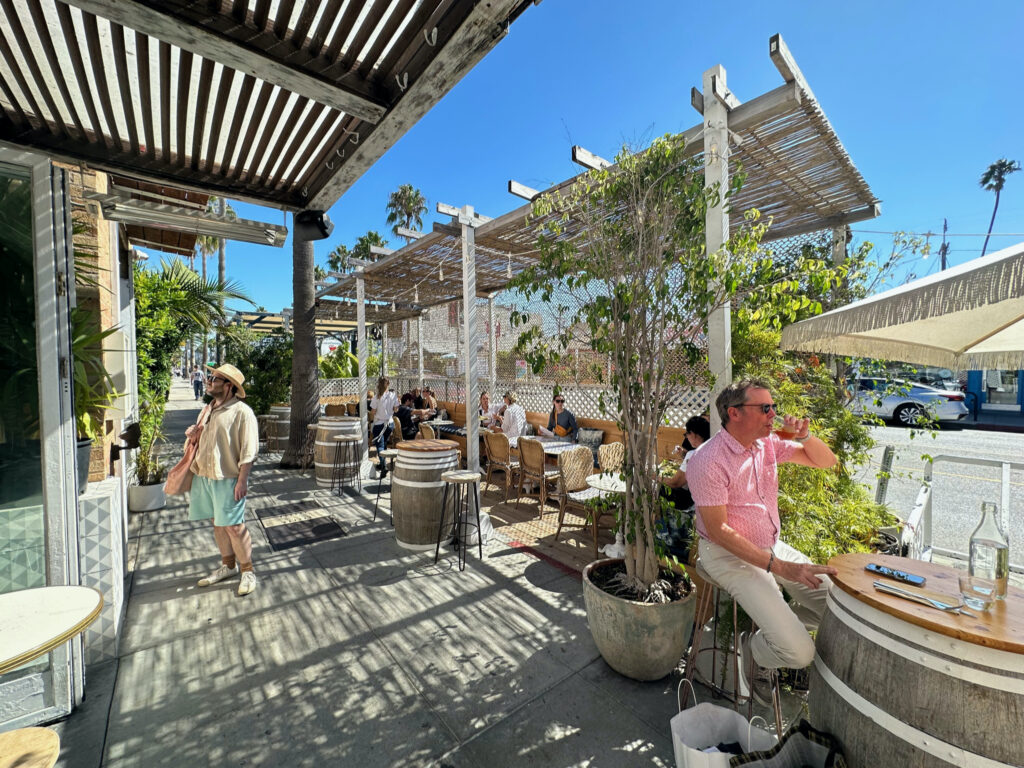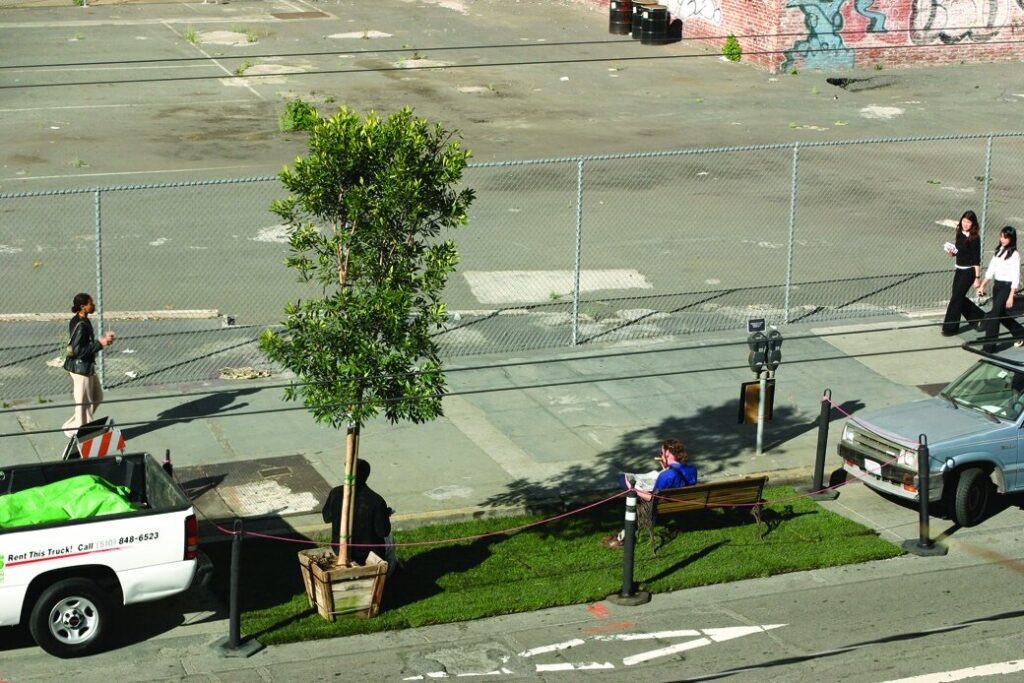
San Francisco (2005) the first-ever Park(ing) Day installation designed and implemented by Rebar. Read more here.
International Parklet Symposium 2024
Bologna (Italy) & online / 18-20 September 2024
The modern parklet was created in San Francisco in 2009, building upon a long legacy of temporary occupation of roadway space to create tiny public spaces. Initially conceived of as a temporary expansion of the sidewalk into the vehicular right of way, parklets have evolved into their own unique space typology. The City of San Francisco Parklet Program has been imitated and adopted globally and parklet-like spaces grew steadily in cities around the world from 2009 to 2019. 2020 witnessed a radical expansion of non-conventional use of the roadway as many communities sought to use outdoor public spaces in the streets as gathering places and for commercial outdoor dining and retail. While recent years have witnessed a contraction of these pandemic-era uses of streets, many communities are continuing to grapple with some fundamental questions about these spaces; such as: Are they public or private? How to balance commercial and community uses of the curb lane? Who administers these programs and how do municipalities manage a fee structure for public and commercial uses of the public right of way? How do cities balance this explosion of user-generated uses of the public right of way while maintaining standards of accessibility, public safety, and design quality in the public realm?
Please join us for an international convocation to debate and discuss the above questions with some of the founders and leaders of the Parklet movement. Help craft a manifesto including principles and design guidelines that can inform an EU parklet standards document. Participate in a Park(ing) Day event in Bologna. Submit research and writing for a special publication in The Journal of Public Space dedicated to this topic.
Initiators and curators
John Bela (Bela Urbanism), Luisa Bravo (City Space Architecture), Ryan Smolar (PlacemakingUS), Robin Abad Ocubillo (City of Oakland, USA) and Ilaria Salvadori (City of San Francisco, USA).

with the patronage of
Culture Commission, Chamber of Deputies, Italian Government
United States Embassy in Rome
Emilia-Romagna Region
Municipality of Bologna

on the occasion of
European Mobility Week “Shared Public Spaces” promoted by Fondazione IU Rusconi Ghigi
Park(ing) Day

PROGRAM AT A GLANCE
DAY 1 (two sessions) – Wednesday, 18 September 2024 / ONLINE
An online gathering of global scholars and practitioners to present initiatives on the transformation of public space, with round table discussions and engagement of the online audience in Q&A sessions.
DAY 2 (whole day) – Thursday, 19 September 2024 / IN PERSON
Gather in Bologna and participate in a day-long symposium on parklets, temporary uses, and co-creation of public space, facilitated by today’s leaders in the field.
DAY 3 (morning) – Friday, 20 September 2024 / IN PERSON
Participate in Bologna’s first-ever Park(ing) Day event and tour some of the city’s diverse public spaces.
DAY 3 (afternoon) – Friday, 20 September 2024 / IN PERSON
A smaller group of leaders in the field will gather at Museo Spazio Pubblico to begin to craft a Parklet Manifesto for the European Union.
FULL PROGRAM
PARTICIPATION AND FEES
We will accept a maximum of 200 participants for the online symposium on Wednesday 18 September.
We will accept a maximum of 100 participants for the symposium on Thursday 19 September (whole day) and on the celebration of Park(ing) Day on 20 September (morning).
Submit your expression of interest by 16 September to secure your place.
Your data will be used to understand your profile and background and to organize content and group discussions at the symposium.
REGISTRATION
After you have submitted your expression of interest you can register at this link.
Participants will be asked to pay:
– € 50 (full fee) / € 35 (reduced fee – ONLY for students) for the online symposium on 18 September, to support the organization of the online gathering and the publication of the special issue of The Journal of Public Space. This fee includes your ticket to the Online Symposium on Wednesday September 18 and the possibility to be engaged in the Q&A session during the symposium. In addition, you will be invited to a special mentorship online session of the Public Space Academy.
– €150 for the in-presence symposium + Park(ing) Day event on 19-20 September. This fee includes your ticket to the Bologna Symposium on Thursday September 19 and the engagement on the activities for Park(ing) Day on September 20 (in the morning). This fee includes also the membership of City Space Architecture until 31 December 2024.
PUBLICATION
Are you interested in publishing a research article or a case study related to parklets, temporary uses, and co-creation of public space? We will publish a special issue of The Journal of Public Space in 2025.
Call for Abstracts
Publication of the call for abstracts: 14 June 2024
Deadline for abstract submission: 25 July 2024
Notification of accepted abstracts: 20 August 2024
Deadline for full paper submission: 2 December 2024
Notification of comments from peer-reviewers: July 2025
Publication (expected): December 2025
We accept abstract proposals ONLY on >>> Oxford Abstracts by no later than 25 July 2024.
The best abstract proposals will be selected to be presented at the International Parklet Symposium.
About the initiators and curators
John Bela is an urbanist, public space designer, and artist. John co-founded Rebar, the creators of Park(ing) Day in 2005 and designed some of San Francisco’s first Parklets. John currently runs Bela Urbanism, a public space design studio based in the San Francisco Bay Area.
Luisa Bravo is a public space scholar and passionate activist. Through her non-profit organization City Space Architecture, founded in 2013, she promotes public space culture on a global scale, collaborating with UN-Habitat and leading institutions. She has initiated several innovative projects, including The Journal of Public Space and the Public Space Academy, and has organized networking events at UN summits, such as the Habitat III conference (Quito, 2016) and the World Urban Forum (Kuala Lumpur, 2018; Abu Dhabi, 2020; Katowice, 2022). She designed and implemented the first-ever parklet in Bologna as part of the project “A-Place”, co-funded by the Creative Europe program of the European Union, intended as a response to the physical distancing imposed by the COVID-19 pandemic (2020). She is the founder and curator of Museo Spazio Pubblico, a transdisciplinary, inclusive, and plural practice that experiments methodologies at the intersection of art, architecture, and technology to investigate the complexity of public space culture. She has a strong background in research and academia and has been the recipient of prestigious fellowships and awards, such as the Marco Polo Research Fellowship, fully funded by the University of Bologna and hosted at the University of California Berkeley, College of Environmental Design (2012), and the Australia Award Endeavour Fellowship, fully funded by the Australian Government and hosted at the Queensland University of Technology (2018). Since 2013 she has been an Adjunct Professor in Urban Design at the University of Florence.
Ryan Smolar directs the PlacemakingUS Network, a pivotal organization in the United States focused on sharing innovative placemaking strategies, best practices, and insightful case studies, both domestically and internationally through our collaboration with the global PlacemakingX Network. Amidst the challenges of the pandemic, our team spearheaded the promotion of parklets. This initiative enabled restaurants, businesses, and social organizations to creatively utilize outdoor spaces for gathering, thereby enhancing community engagement and visibility. A notable achievement was our collaboration with a Cambodian nonprofit to launch the “Night Marklet,” an inventive fusion of a Night Market and a Parklet. Additionally, we played a key role in drafting city-level regulations that facilitated the allocation of $1.9 million in recovery funds to develop parklets for small businesses.
Robin Abad Ocubillo is a dedicated public servant with a passion for civic innovation in public space design, planning, evaluation, and policy. From 2020-2023, he served as Director of Shared Spaces San Francisco, the City’s banner public space programs. He shepherded its legislation into a permanent program that continues to help communities leverage the public realm for economic recovery, social and psychological wellbeing. Shared Spaces built upon Places for People, the first placemaking ordinance of its kind in the country for which Robin was the City’s principal planner.
Robin has led several of the City’s placemaking programs during a periods of intensive growth; multiplying the parklet population tenfold, expanding partnerships to cultural and community institutions, and overseeing the development of an award-winning Shared Spaces Manual (2023) and Parklet Manual (2015). A scholar of public space innovation in California, Robin has also published numerous public life studies on parklets; starting with inauguration of parklets in Los Angeles (2013) and also in San Francisco (2013-2023). He has extensively developed research methods and metrics for human-use evaluation of public spaces and is co-author of the Global Public Life Data Protocol (SF Planning, Gehl Institute, and City of Seattle, 2018). Robin is also producer and curator with the San Francisco Urban Film Festival, bringing communities together around civics and storytelling. As a Resident of Film and Civics at the YBCA (2020-2022), he curated “Echo Location: Cultural Geopolitics in the South of Market (2021),” exploring the decades-long synergies between Filipinx and LGBTQ community activism in that neighborhood. He has guest-edited an edition of Open Space Magazine at SFMOMA titled ‘Participatory Urbanism (2021),’ which interrogated the promise and problematics of public space; asking who participates — and how — in constructing urban places. He serves on the boards of Illuminate the Arts and the Yerba Buena Center for the Arts.
In June 2023, Robin joined the City Administrator’s office of Oakland, across the Bay from San Francisco, in a newly created role centering by citywide equity and neighborhood resiliency through civic innovation across departments and agencies.
Ilaria Salvadori is an urban designer with the City Design Group at the San Francisco Planning Department (USA). She is a senior designer for the Groundplay program, a successful public space initiative aimed at reclaiming underutilized spaces in the city and turning it into vibrant catalyst places for San Francisco neighborhoods. She is currently working in the Tenderloin neighborhood, managing the Public Space Initiative of the Tenderloin Community Action Plan -one of the first community-led Participatory Budgeting efforts in the country.
While at the San Francisco Planning Department, Ilaria has helped create the Mission Community Market, the first open air market in the Mission District and has managed the Mission District Streetscape Plan, the Cesar Chavez East Community Design Plan and the Mission Public Life Plan, three community-based projects that rethink streets as multi-modal, inclusive spaces for people.
A graduate of UC Berkeley College of Environmental Design, Ilaria has previously worked at several urban design firms in the San Francisco Bay Area and at Project for Public Spaces, a public space advocacy organization in New York City. Her expertise is in community design, storytelling and empowering citizens to bring change in their everyday spaces.
She was born and raised in Milan, Italy.
Contact us
parkletsymposium@museospaziopubblico.it
Bologna, Italy (2020), a parklet designed and implemented by City Space Architecture during the COVID-19 pandemic as a response to the physical distancing, co-funded by the Creative Europe program of the European Union. Read more here.
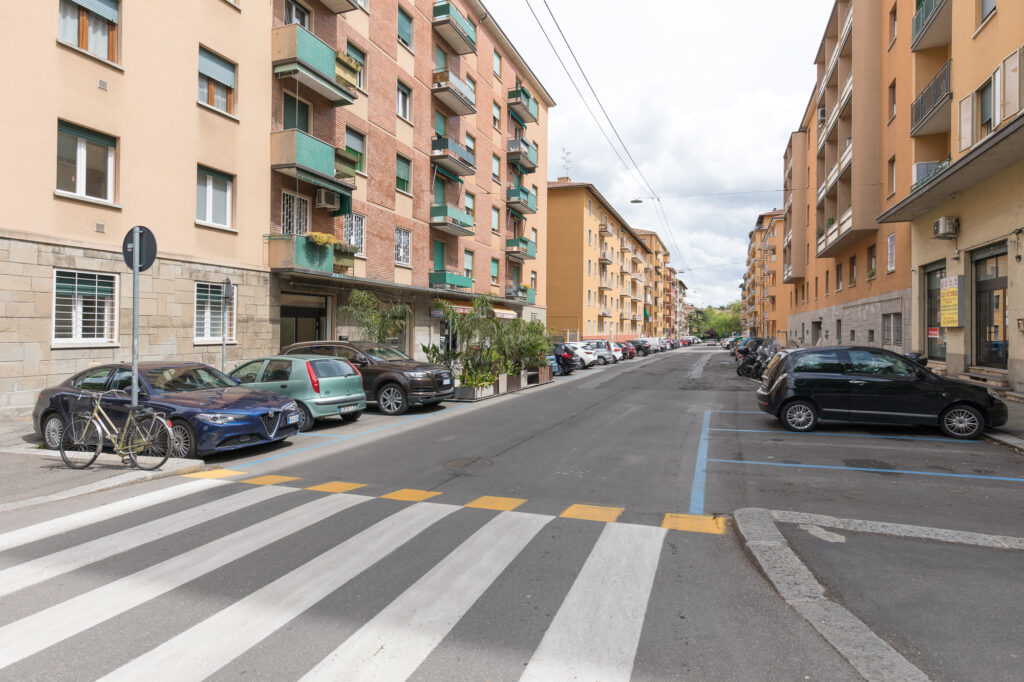
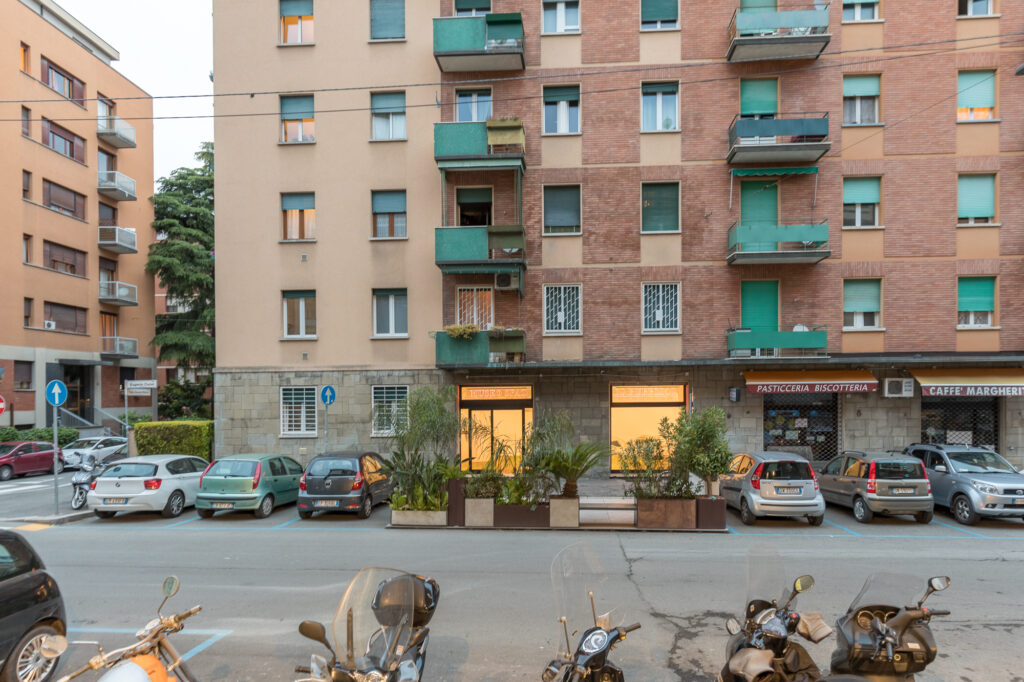
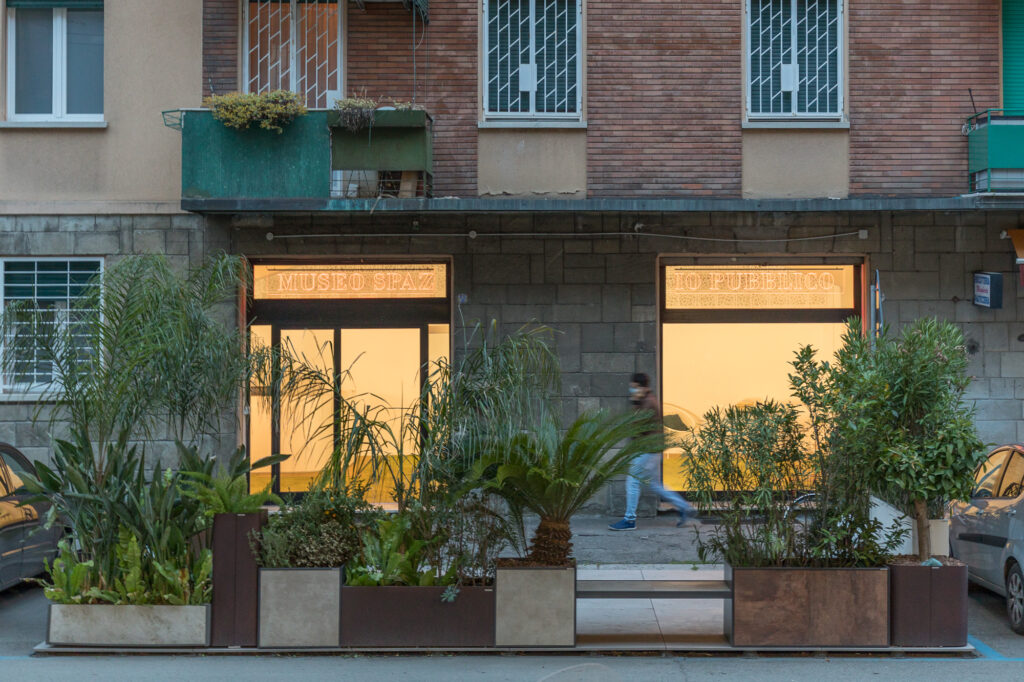
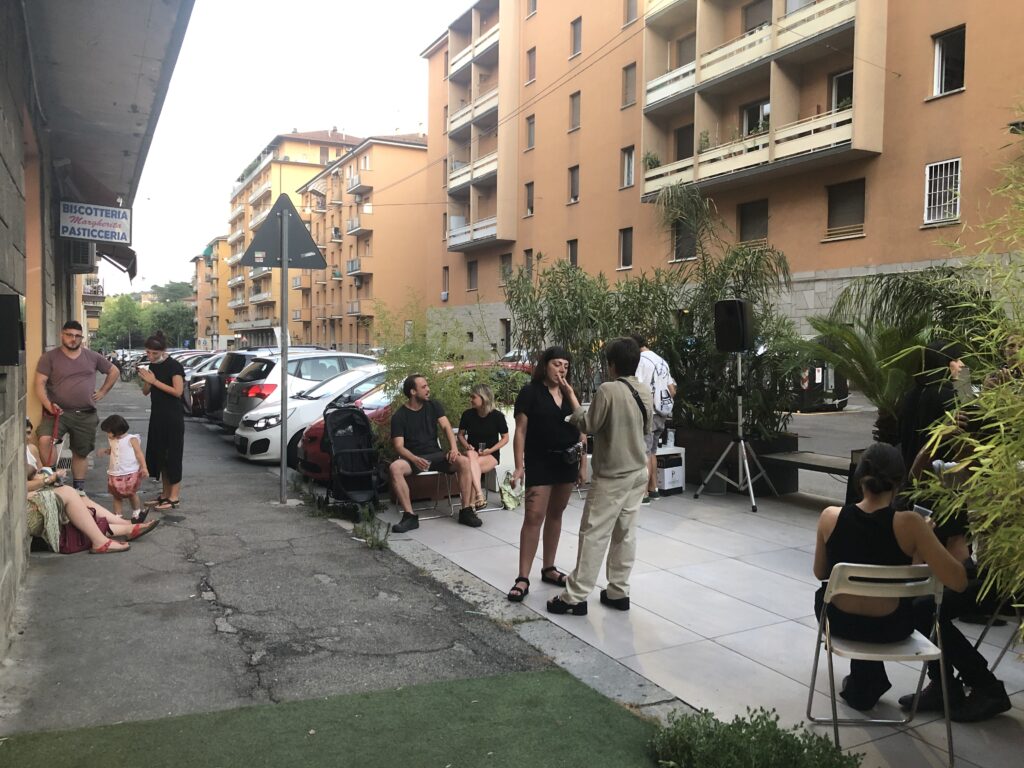
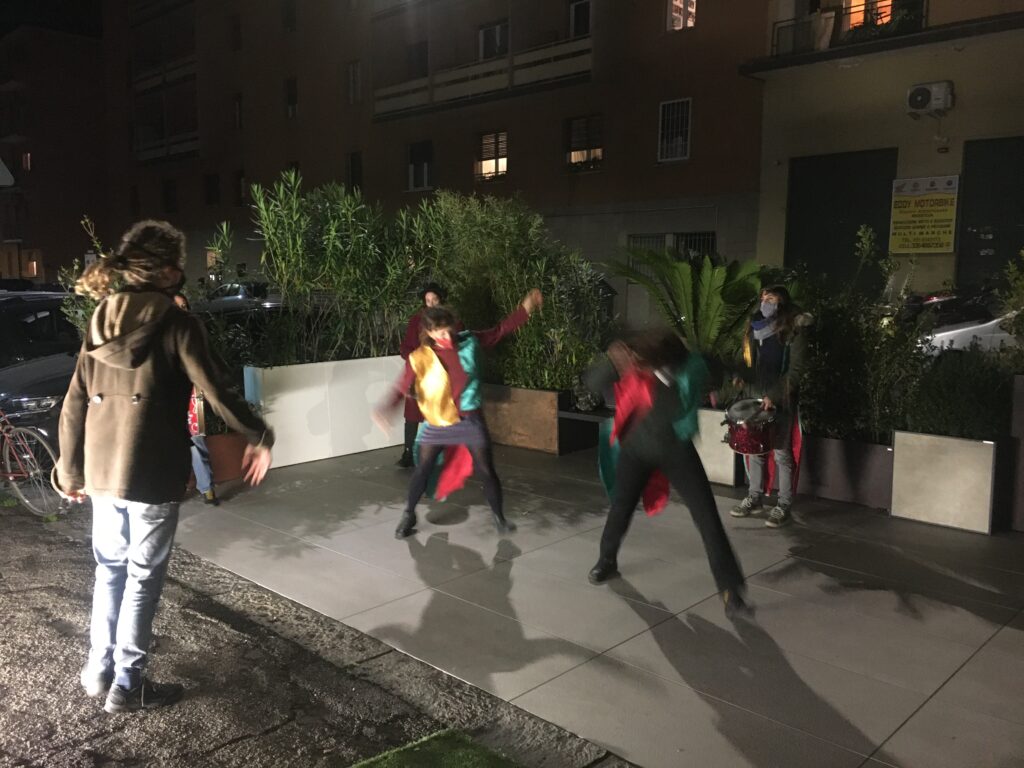
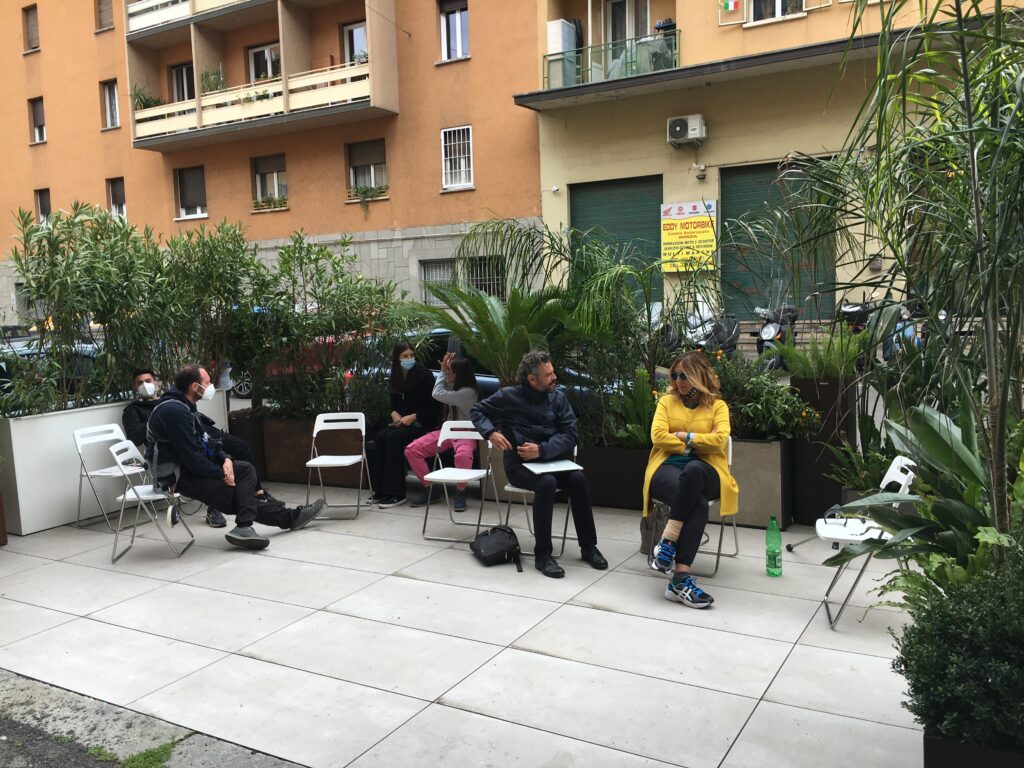
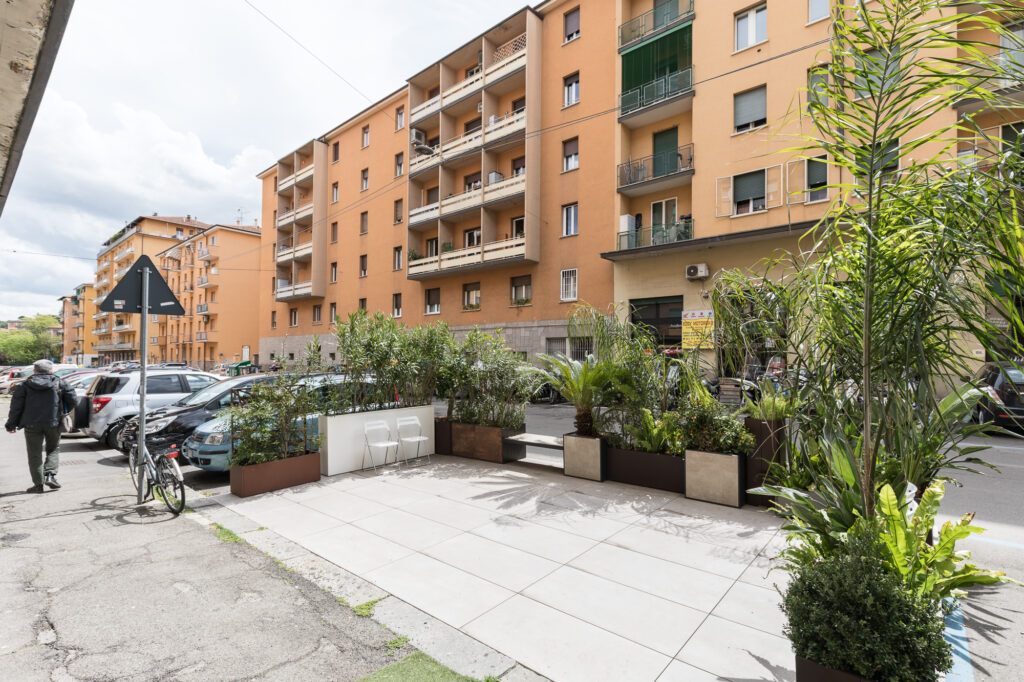
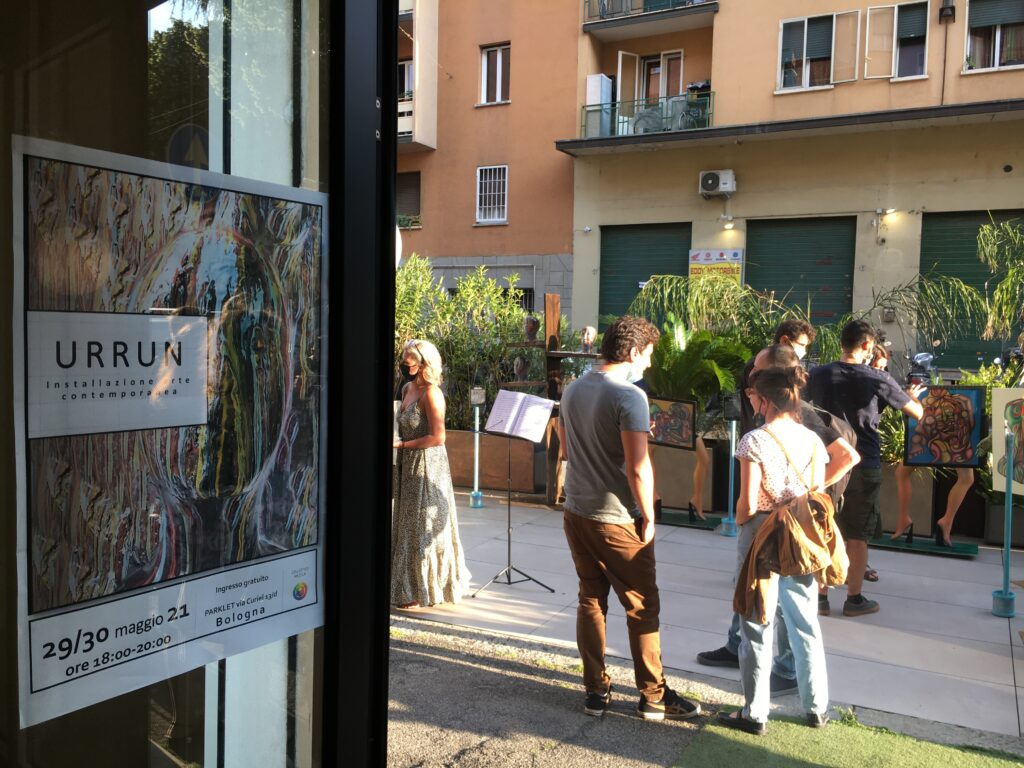
Long Beach, USA (2022), a parklet designed and implemented by PlacemakingUS in partnership with The MAYE Center in a Cambodian neighborhood that hosts a monthly night market. Read more here.
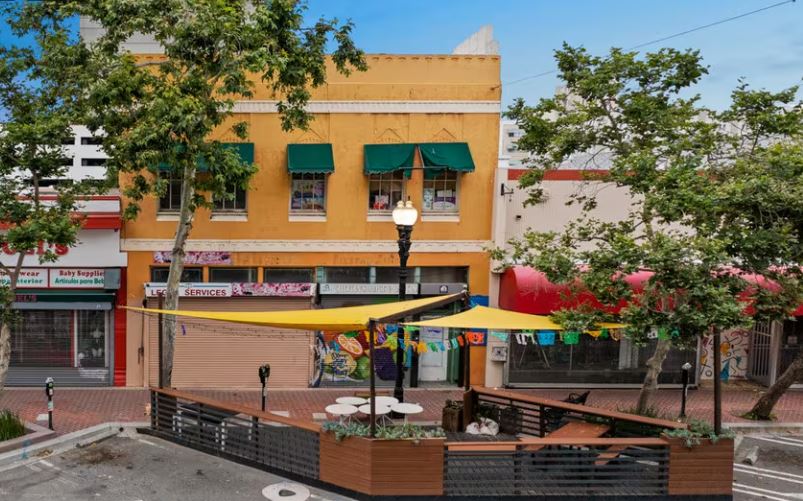
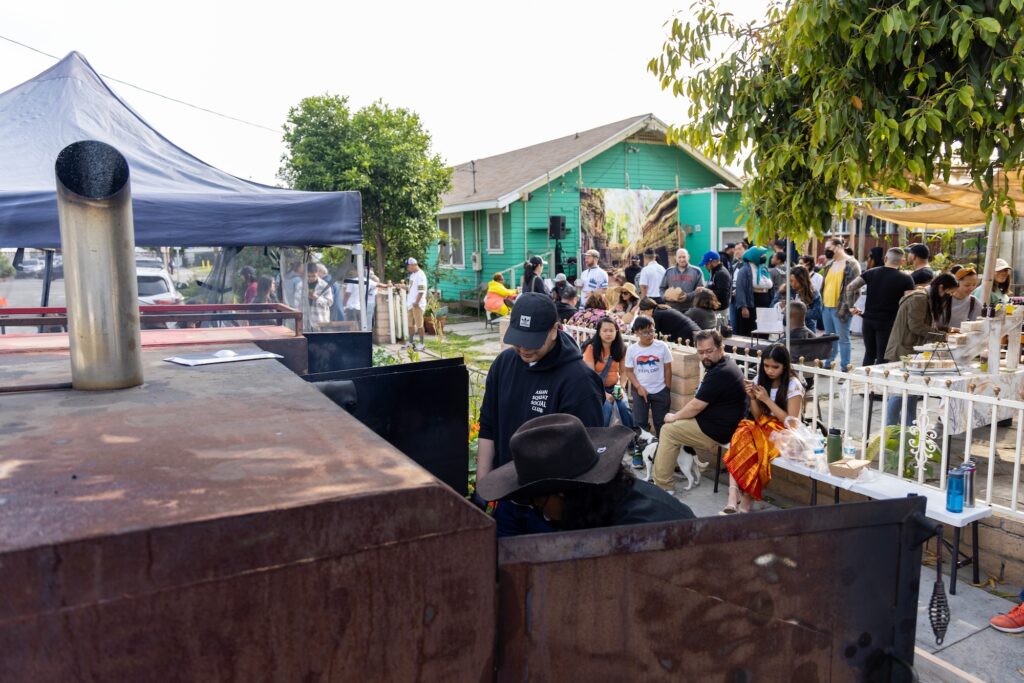
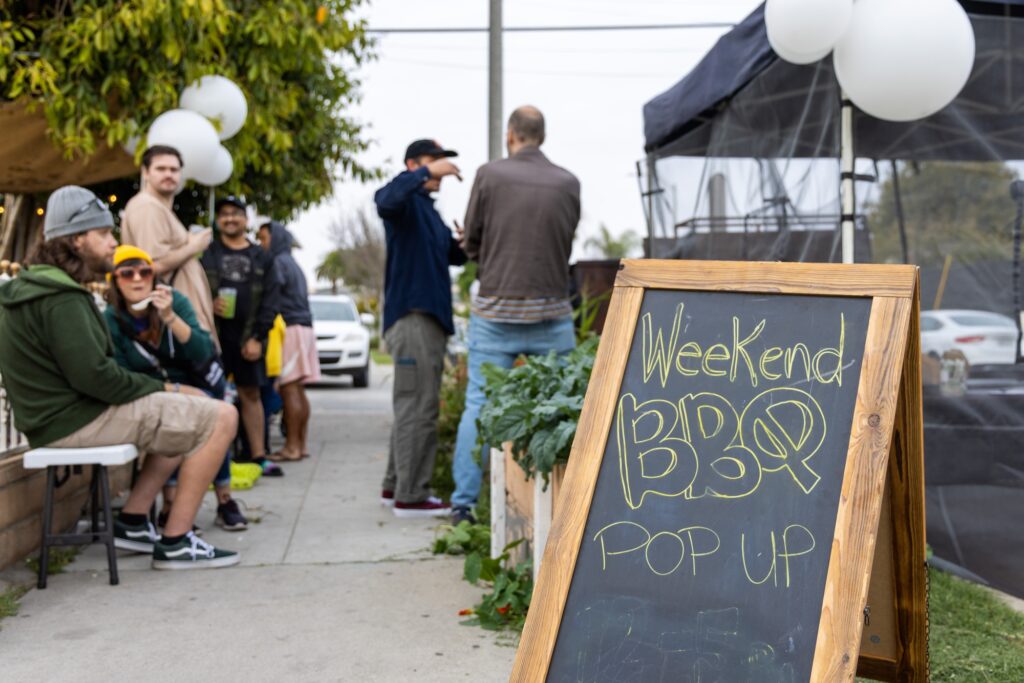
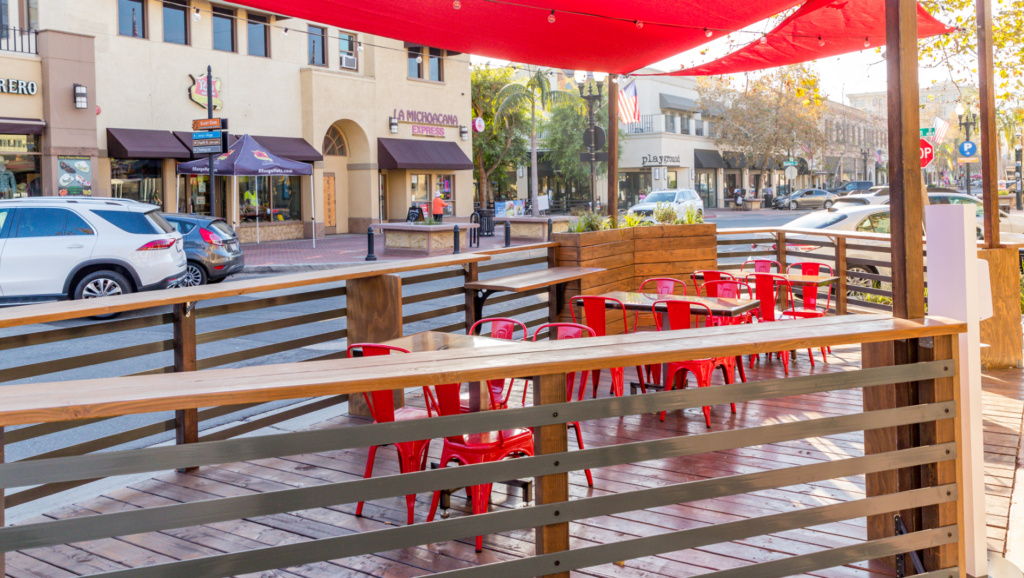
San Francisco, USA (2011 / 2024), several parklets designed and implemented by Rebar (three above), and a Parklet on Abbot-Kinney Boulevard in Los Angeles.
